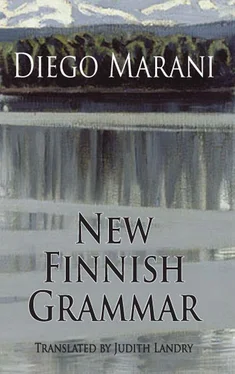That day, he had come to sit beside me in the refectory. I had never seen him eat there before; I assumed he ate his meals at the table in the sacristy. Without a word, he began drinking his soup with his usual systematic haste. When he had wiped the bowl clean and devoured the last bit of bread, he pushed the tin tray away from him and raised his eyes.
‘The ice is melting! The Germans have reached Uhtua!’ he pronounced cautiously, as though imparting a secret.
‘Soon it will be up to us again,’ he added darkly. ‘And then we will have to do what the great runoilija Väinämöinen did: find the right words to break the spell. Because in essence the war we’re fighting now is the same war we Finns have been engaged in ever since our birth, the one we started so long ago with Pohjola, queen of the shades: to speak, and sing, more loudly than the rest. You who are studying our language, you must know this. To sing is lauluaa , which also means to enchant. But for the ancient Finnish poets, to sing — or, if you like, to chant — and to enchant, were one and the same. Anyone who could sing could also enchant. Not for nothing does the Kalevala begin with a singing contest between two singers, or runoilija . Joukahainen, presumptuous and ill-prepared, dares to challenge the ageing Väinämöinen in the art of magic song and is beaten by him, silenced by his art. Väinämöinen puts stone shoes on Joukahainen’s feet, wooden breeches on his legs, a heavy weight upon his chest, piles of stones upon his shoulders, stone gloves on his hands, a granite cape upon his head. This is what the Kalevala says. Such is the magic of song. But only those who are fully acquainted with the power of the word should dare to have recourse to its magic!’
Now the refectory was emptying out. Weak rays of sun were filtering through its high windows, casting a gentle light over the violet smoke rising from the cigarettes of the last few stragglers; clouds of dust swarmed in the gilded air. Some nurses had already started cleaning the floor, dragging heavy pails of steaming water behind them and dipping soapy cloths into them. From time to time, their metallic clang drowned out the pastor’s words, causing him to raise his voice in irritation. When he was saying something complicated, he knew that he had to repeat himself, and break the more complex sentences into their simpler component parts so that I had a chance of understanding. But, in the grip of habit, with time he had come to use this method indiscriminately, each time he addressed me. That was how he proceeded that day in the refectory, heedless of the nurses as they looked in his direction, shooting him politely curious glances.
‘Väinämöinen was above all a shaman, a worker of magic. Such shamans used to drug themselves on magic mushrooms, whose hiding places in the woods were known only to them. These mushrooms sent them into a state of ecstasy which cut them off from the real world: they would leave their own bodies to hover somewhere outside reality, where they would discover signs, receive revelations, cures for illnesses, formulae which would drive off wild beasts and serve as protection against injury. They were vouchsafed the world of visions, of another realm, of dreams. The greatest of all these shamans was the giant Antero Vipunen: he travelled so far from his own body that he could never get back into it. His words were so powerful that they changed the course of nature; even today, in his vain effort to return to it, his soul wanders around the tangle of brambles that his abandoned body became. And it is to Antero Vipunen that Väinämöinen goes to ask for the three words he was lacking to complete his magic boat, the one that was to take him to the land of Pohjola. In the primitive world everything was new and boundless, even pain. That is why, when they are feeling pain, the heroes of the Kalevala can split the eternal ice with a single blow of the foot, raze a forest to the ground with a single sabre cut, bring about a migration of cranes with a single shout. That is why, even today, we Finns are capable of infinite endurance. Soon the Russians will attack, and then it will take all the strength we can muster, all our powers of endurance, all the words of Antero Vipunen to stop them. Nothing good has ever come out of the East: only invasions. Relentless waves of Slavs have poured repeatedly over our land; war against them will cease only when we have exterminated them or driven them off. Because, by some quirk of fate, we have stuck ourselves right in their path. If only the Turks had stopped at Samarkand!’ he exclaimed, waving his arms in the air with rage.
The nurses’ mops were already lapping at our feet; the floor was steaming from the boiling water. The smell of ammonia had won out against that of turnip soup. My thoughts were with the giant Antero Vipunen, locked out of his own body, and I knew how he felt. I had not understood the story of the magic boat, but it was too complicated to ask, so I decided to ask what the word kattohaikarat meant instead. Koskela rose suddenly to his feet, imitating a large bird with a long beak and outspread wings. The nurses looked at him wryly.
‘No lessons today; I’m expecting visitors,’ he said abruptly, and his eyes, now strangely cloudy, were also strangely bright. I took my jacket from the coat rack and followed him from a distance into the corridor, then into the courtyard. As usual, I had not slept much that night, and was thinking of going to lie down in the visitors’ quarters, but then I saw him heading for the church, and automatically went after him, reaching the sacristy door just in time to hear the key turn in the lock. That was the day that I learned that Olof Koskela took drugs. I saw him through the sacristy window. Seated at the empty table, he was slipping a pinch of some greenish powder under his tongue; it looked a bit like mildew, and he had taken it out of a small pocket snuff-box. Then he placed his elbows firmly on the table, stretched his fingers out over the veining in the wood, so similar to that on his own hands, and stayed there motionless, staring interminably at the wall in front of him, as though he could see something there: something infinitely small, or the size of the wall itself, I do not know, but it was as though it could be seen only from that particular spot. As it appeared, his features changed, his face became a mask, with empty eye sockets and a gaping mouth. The being seated in that sparsely furnished room was no longer a man: he was a totem, with a tough wooden skin. On making this discovery, at first I felt betrayed: I felt that even the pastor was deserting me. His strength of spirit, which had brought me such support and comfort, appeared to me now merely as some chemically-produced elation, on a par with my own koskenkorva -fuelled drunkenness. But this feeling was short-lived. I preferred to believe that, like Antero Vipunen, the pastor was going down into his unconscious in search of the right word, the answer to all pain. Finding him suddenly so vulnerable, I felt that he was closer to me. I realized that his harsh exterior served not to shut others out, but to shut himself in: to contain the unstable magma which seethed within him. The order he imposed upon his days was a form of self punishment, meted out as penance for the unruly ramblings of his spirit; the rigour with which he went about his daily round offered some protection against the irrational into which he periodically ventured. Now I found his various fixations more understandable: behind his dogged insistence that the missals be tidily stacked away each night, the candlestick cleaned, the pencils sharpened and the brass numbers indicating the psalms put back where they belonged — behind all this lay the fear of the obscure forces he unleashed within himself. Perhaps, I thought, it was even possible that all that trawling through narcotic worlds might have caused him to stumble upon some trace of my own past.
Читать дальше












